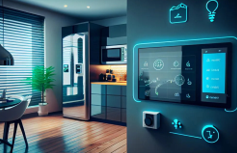Have you ever imagined a home that not only provides comfort but also enhances security, reduces energy consumption, and offers seamless multimedia entertainment?
Beyond these advantages, smart homes are revolutionizing healthcare, childcare, and elderly care, making life easier and more efficient for residents.
In Ghana, the rise of smart home technology is slowly but steadily changing the housing landscape.
Understanding smart homes
A smart home is not just a building; it is a living space equipped with technology that automates household tasks, enhances security, and optimizes energy usage.
These homes integrate devices such as smart thermostats, voice-controlled assistants, automated lighting systems, and remote security monitoring. The convenience and efficiency they provide make them an attractive option for homeowners looking to embrace the future of living.
Smart homes can be acquired in two ways: a home can either be designed and built from scratch with smart features incorporated, or an existing home can be retrofitted with smart technology to transform it into a modern, connected space (Alam et al., 2012; Marikyan et al., 2018).
The growing trend of smart homes in Ghana
As technology continues to advance globally, Ghana is not being left behind. The country is experiencing a gradual shift towards smart home adoption, particularly in urban centers like Accra and Kumasi, where the demand for convenience, security, and energy efficiency is increasing.
Several factors are driving this trend:
- Technological advancements: The growth of IoT (Internet of Things) and AI (Artificial Intelligence) is making smart home technology more accessible and affordable.
- Energy efficiency needs: With frequent power fluctuations and high electricity costs, many homeowners are looking for energy-saving solutions such as smart lighting and automated power management systems.
- Security concerns: The rise in home security concerns has led to an increased demand for smart security systems, including surveillance cameras, motion detectors, and automated locks.
- Real estate development: Developers are incorporating smart home features into new housing projects to attract modern buyers who prioritize convenience and sustainability.
The challenges of smart home adoption in Ghana
Despite the promising rise of smart homes, there are notable challenges hindering their widespread adoption:
- High cost of implementation: Smart home technology requires significant financial investment, making it less accessible to the average Ghanaian homeowner.
- Limited public awareness: Many people are still unfamiliar with how smart home technology works and the benefits it offers, leading to slow adoption rates.
- Technological literacy: Operating smart home devices requires a certain level of technological literacy, which can be a barrier for individuals unfamiliar with digital automation.
- Unstable internet connectivity: A strong and stable internet connection is crucial for the seamless operation of smart devices, but inconsistent connectivity in some parts of Ghana poses a challenge.
Sustainability and the future of smart homes in Ghana
For smart home technology to be sustainable in Ghana, key stakeholders—including the government, real estate developers, and technology providers—must work together to overcome the existing challenges.
- Affordable solutions: Companies need to explore cost-effective smart home solutions that cater to the middle-income market.
- Public awareness campaigns: Educational programs and demonstrations can help inform the public about the benefits of smart homes and how to integrate them into daily life.
- Infrastructure development: Improvements in internet connectivity and reliable power supply will facilitate smoother adoption and integration of smart home technologies.
- Partnerships and incentives: The government and private sector can collaborate to provide incentives such as tax breaks or subsidies for homeowners investing in smart technology.
The smart home lifestyle: a new way of living
The concept of home is evolving. No longer just a place to sleep, modern homes are becoming central hubs for work, entertainment, security, and comfort. The rise of smart homes in Ghana signifies a shift towards a technology-driven lifestyle, offering homeowners enhanced convenience and efficiency.
Despite the financial commitment required to adopt this lifestyle, many Ghanaians are increasingly recognizing the value of smart homes. As awareness grows and technology becomes more accessible, the future of smart homes in Ghana looks promising.
Ultimately, smart homes represent more than just luxury—they are the future of sustainable, efficient, and secure living. For individuals looking to invest in a home that aligns with the demands of modern life, smart homes are undoubtedly a worthwhile consideration.

Source: Housing In Ghana Magazine
Housing in Ghana magazine is a publication under the Housing in Ghana Foundation, an organization that is committed to promoting and facilitating access to quality housing solutions across Ghana. The bi-annual magazine publication serves as a comprehensive guide for individuals, families investors as well as other key industry players seeking information on real estate trends and news, property listings and investment opportunities within the country. Email: [email protected] 0555444665 | 0599663344










